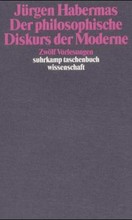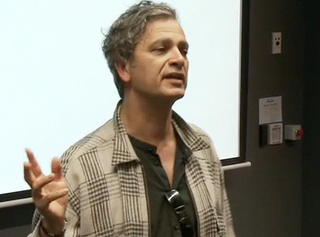
Max Horkheimer was a German philosopher and sociologist who was famous for his work in critical theory as a member of the Frankfurt School of social research. Horkheimer addressed authoritarianism, militarism, economic disruption, environmental crisis, and the poverty of mass culture using the philosophy of history as a framework. This became the foundation of critical theory. His most important works include Eclipse of Reason (1947), Between Philosophy and Social Science (1930–1938) and, in collaboration with Theodor Adorno, Dialectic of Enlightenment (1947). Through the Frankfurt School, Horkheimer planned, supported and made other significant works possible.

Hermeneutics is the theory and methodology of interpretation, especially the interpretation of biblical texts, wisdom literature, and philosophical texts. As necessary, hermeneutics may include the art of understanding and communication.

The Frankfurt School is a school of thought in sociology and critical philosophy. It is associated with the Institute for Social Research founded at Goethe University Frankfurt in 1923. Formed during the Weimar Republic during the European interwar period, the first generation of the Frankfurt School was composed of intellectuals, academics, and political dissidents dissatisfied with the contemporary socio-economic systems of the 1930s; namely, capitalism, fascism, and communism.
Ram Roy Bhaskar was an English philosopher of science who is best known as the initiator of the philosophical movement of critical realism (CR). Bhaskar argued that the task of science is "the production of the knowledge of those enduring and continually active mechanisms of nature that produce the phenomena of the world", rather than the discovery of quantitative laws, and that experimental science makes sense only if such mechanisms exist and operate outside the lab as well as inside it. He went on to apply that realism about mechanisms and causal powers to the philosophy of social science, and he also elaborated a series of arguments to support the critical role of philosophy and the human sciences. According to Bhaskar, it is possible and desirable for the study of society to be scientific.

Axel Honneth is a German philosopher who is the Professor for Social Philosophy at Goethe University Frankfurt and the Jack B. Weinstein Professor of the Humanities in the department of philosophy at Columbia University. He was also director of the Institut für Sozialforschung in Frankfurt am Main, Germany between 2001 and 2018.

Communicative rationality or communicative reason is a theory or set of theories which describes human rationality as a necessary outcome of successful communication. This theory is in particular tied to the philosophy of German philosophers Karl-Otto Apel and Jürgen Habermas, and their program of universal pragmatics, along with its related theories such as those on discourse ethics and rational reconstruction. This view of reason is concerned with clarifying the norms and procedures by which agreement can be reached, and is therefore a view of reason as a form of public justification.
Aletheia or Alethia is truth or disclosure in philosophy. Originating in Ancient Greek philosophy, the term was explicitly used for the first time in the history of philosophy by Parmenides in his poem On Nature, in which he contrasts it with doxa.
In sociology, communicative action is cooperative action undertaken by individuals based upon mutual deliberation and argumentation. The term was developed by German philosopher-sociologist Jürgen Habermas in his work The Theory of Communicative Action.
Martin Heidegger, the 20th-century German philosopher, produced a large body of work that intended a profound change of direction for philosophy. Such was the depth of change that he found it necessary to introduce many neologisms, often connected to idiomatic words and phrases in the German language.

Michael E. Zimmerman is an American philosopher, integral theorist, author, and academic. He is a Professor Emeritus of Philosophy for Tulane University and University of Colorado at Boulder.
An argument is a series of sentences, statements, or propositions some of which are called premises and one is the conclusion. The purpose of an argument is to give reasons for one's conclusion via justification, explanation, and/or persuasion.

The Philosophical Discourse of Modernity: Twelve Lectures is a 1985 book by the philosopher Jürgen Habermas, in which the author reconstructs and deals in depth with a number of philosophical approaches to the critique of modern reason and the Enlightenment "project" since Georg Wilhelm Friedrich Hegel and Friedrich Nietzsche, including the work of 20th century philosophers Max Horkheimer, Theodor Adorno, Martin Heidegger, Michel Foucault, Jacques Derrida, Cornelius Castoriadis and Niklas Luhmann. The work is regarded as an important contribution to Frankfurt School critical theory. It has been characterized as a critical evaluation of the concept of world disclosure in modern philosophy.
World disclosure refers to how things become intelligible and meaningfully relevant to human beings, by virtue of being part of an ontological world – i.e., a pre-interpreted and holistically structured background of meaning. This understanding is said to be first disclosed to human beings through their practical day-to-day encounters with others, with things in the world, and through language.

Nikolas Kompridis is a Canadian philosopher and political theorist. His major published work addresses the direction and orientation of Frankfurt School critical theory; the legacy of philosophical romanticism; and the aesthetic dimension(s) of politics. His writing touches on a variety of issues in social and political thought, aesthetics, and the philosophy of culture, often in terms of re-worked concepts of receptivity and world disclosure—a paradigm he calls "reflective disclosure".

Fred Reinhard Dallmayr is an American philosopher and political theorist. He is Packey J. Dee Professor Emeritus in Political Science with a joint appointment in philosophy at the University of Notre Dame (US). He holds a Doctor of Law from the Ludwig Maximilian University of Munich, and a PhD in political science from Duke University. He is the author of some 40 books and the editor of 20 other books. He has served as president of the Society for Asian and Comparative Philosophy (SACP); an advisory member of the scientific committee of RESET – Dialogue on Civilizations (Rome); the executive co-chair of World Public Forum – Dialogue of Civilizations (Vienna), and a member of the supervisory board of the Dialogue of Civilizations Research Institute (Berlin).
In Marxist philosophy, reification is the process by which human social relations are perceived as inherent attributes of the people involved in them, or attributes of some product of the relation, such as a traded commodity.

A critical theory is any approach to humanities and social philosophy that focuses on society and culture to attempt to reveal, critique, and challenge power structures. With roots in sociology and literary criticism, it argues that social problems stem more from social structures and cultural assumptions rather than from individuals. Some hold it to be an ideology, others argue that ideology is the principal obstacle to human liberation. Critical theory finds applications in various fields of study, including psychoanalysis, film theory, literary theory, cultural studies, history, communication theory, philosophy, and feminist theory.
Receptivity, or receptive agency, is a practical capacity and source of normativity, which, according to the philosopher Nikolas Kompridis, has both ontological and ethical dimensions, and refers to a mode of listening and "normative response" to demands arising outside the self, as well as "a way by which we might become more attuned to our pre-reflective understanding of the world, to our inherited ontologies," thereby generating non-instrumental possibilities for social change and self-transformation. Kompridis has argued for the importance of receptivity to democratic politics, romanticism and critical theory.
Disclosing New Worlds: Entrepreneurship, Democratic Action, and the Cultivation of Solidarity (1997) is a book co-authored by Fernando Flores, Hubert Dreyfus and Charles Spinosa. It is a philosophical proposal intended to restore or energize democracy by social constructionism via an argument style of world disclosure but which philosophy is distinct from:








